In today’s digital age, social media has become an integral part of any successful business strategy. With the plethora of platforms available, each offering unique features and targeting specific demographics, choosing the right channel for your business can be a daunting task. Whether you’re a small startup or a well-established company, it’s crucial to identify which social media channel aligns best with your goals and target audience.
Your business’s presence on social media contributes tremendously to your brand awareness, how you engage with your customers, and gain valuable insights on your products and services.
Forbes says that approximately 4.9 billion people use social media around the world. This number is expected to jump to almost 5.85 billion by 2027.
Merely a presence on any social media is not enough. Today, businesses, whether large or small, have a lot of options for social media channels and not being present on the right platform makes you miss out on massive opportunities.
Let’s delve deeper into the best social media platforms for businesses and how you can leverage them to drive sales and enhance your brand presence.
Selecting the Social Media Channel for Your Business? Here’s How

Businesses are increasingly realizing the tremendous potential of social media channels.
Almost 75 percent of customers today use social media to research products and expect you to be there. This is especially true for the top service industries like transportation, healthcare, SaaS, and restaurant businesses that are driving the US economy.
Let’s take a quick look at some of the benefits of having a social media presence and why businesses need marketing:
| You connect with your existing and potential consumers faster and easily. | Social media is all about sharing stories. Your brand becomes more humane and relatable. |
| It’s a great way to gain consumer insights into a new product launch or even your customer service and improve it | Social media presence helps you manage crises and build a better reputation. |
| It helps you generate leads directly and indirectly. | Social media is a great way to network and establish your business as a thought leader. |
| It allows you to track your competitor’s activities and stay ahead. | You can forge profitable partnerships through social media groups and communities. |
Now you know how essential social media presence is. But, not all social media channels are created the same. Every platform has its nuances such as:
| Demographics | Age, location, hobbies, and buying behavior |
| Content format | Text, images, or videos |
| Focus | Business-to-business or business-to-consumer |
How To Select The Right Social Media Platform For Your Business?
Before you zero in on a particular social media channel, you need to pay attention to some important considerations for your investment to be worthwhile. These include:
What is the Nature of Your Business?
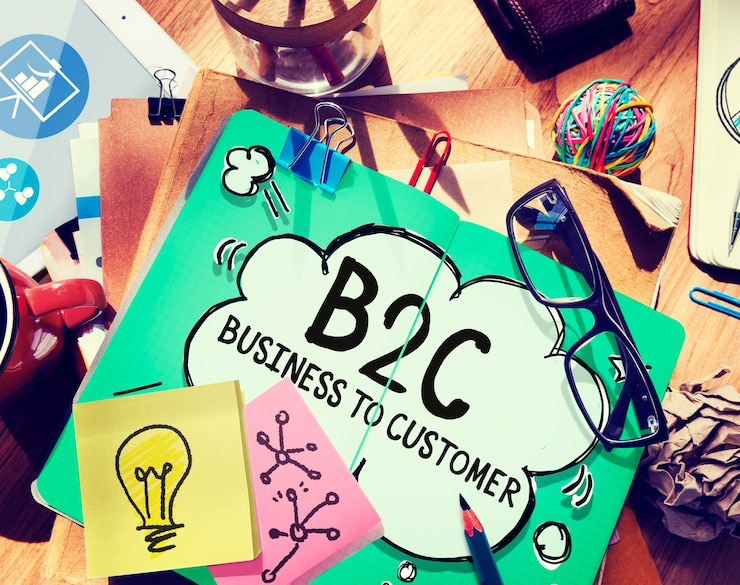
Which social media platform will benefit you the most depends entirely on the nature of your business. This includes your products & services, your brand’s personality, and the kind of content that you will generate.
Not every social media channel works for every industry. For B2C industries such as healthcare and food & beverage, Facebook, TikTok, and Instagram are excellent platforms where they can share high-quality visuals.
For B2B industries like SaaS and transportation, LinkedIn and Twitter work better considering their use base of professionals and formal conversations.
Every business should use YouTube to share-worthy content and share with their audiences.
Do You Understand Your Audience?
The kind of audience that your business serves is one of the most important considerations when choosing the best social media channel. Build an ideal customer profile and know how they use social media. Here are some things to consider:
- How do they use social media?
- What motivates them to use a certain social media channel?
- How do they react to different kinds of content on social media?
For example, if you are in the healthcare industry selling pediatric drugs, your ideal customers will be women expecting a child and new parents.
What are your social media objectives?
- Want to increase your brand’s awareness?
- Get more leads?
- Enhance your engagement with the community
- Drive traffic to your website?
- Sell products?
Your social media goals could be either of these or a combination of some of these goals.
Certain platforms are more suitable for certain things.
For example, if you are in the transportation industry, your goal may be to connect with e-commerce companies for devising logistics solutions. For this, LinkedIn and Twitter are the best platforms to connect with relevant companies.
What is Your Competition Doing?
Considering which social media channel your competitors are using is one of the most important factors that you need to consider while choosing one for yourself.
This is because of simple logic. If your competitor is seeing success on a particular platform, you might too. Alternatively, if your competitors are not present on a relevant platform, you may set to gain from the untapped potential.
Since most businesses share their published social media links on their websites and other forums, it is easy to track their activities. Competitor tracking helps you in more ways than you think:
- It helps you identify the best social media channel for your industry.
- You can understand who your target audience is and how they consume social media.
- You get to know the best content strategy that will work for your target audience. For example, you can get to know how often you should post and what kind of content drives the most engagement.
- You can also learn from their mistakes to avoid pitfalls or loss of resources.
What Will Be Your Content Strategy?
An important deciding factor for the best social media platform is the kind of content that you want to create. Your content should:
- Reflect your brand identity
- Complement and further your business goals
- Be worthy enough to gain the attention of your target consumers
Certain content formats are more suitable to particular social media channel:
Editorial Content
Perfect for B2B businesses that want to establish themselves as thought leaders, this involves publishing articles and blogs. In this case, LinkedIn is the best platform.
Video Content
If you are in the B2C industry and your content is short-form video-based and directed at a younger audience, you may want to consider YouTube, Snapchat, Instagram, and even Facebook.
Image Content
If you have an engaging product line, your business may benefit from sharing good-quality product images on social media platforms like Instagram and Pinterest.
News and Whitepaper Content
Content formats like company news, newsletters, whitepapers, and industry reports are perfect for B2B industries. You will find your audience on professional platforms such as Twitter and LinkedIn.
What is your budget?
Building a social media presence and staying consistent with it needs time and resources. This brings us to another very important consideration- the available resources at hand. Ask yourself these questions:
- Do you have an in-house social media team? How much time can they devote to content creation and posting?
- Do you need to hire a team to manage this responsibility?
The management of some platforms needs more time than others. By considering these options, you can tweak your budgets and choose the best social media platform for your business.
Which Social Media Channels Should I Consider for My Business?
Now that you know the benefits that businesses can gain from social media presence, you may be thinking, with all these incredible benefits, why do some businesses seem to get it wrong and fail on social media?
The problem doesn’t lie in developing a social media presence. That’s a given these days.
The real deal is knowing which platform is the best for your industry and how to leverage its uniqueness to encourage sales and brand awareness.
It’s time to gather your answers about how to choose the right social media channels and match them with our insights about the top platforms and create the perfect mix that will deliver you optimized results.
It is also helpful to know that social media platforms are dynamic and have changed drastically over the few years. Factors such as the rise of mobile phones, new technologies like Artificial Intelligence, and the increasing use of newer content strategies like live streaming and videos have impacted the way these platforms are used now by businesses.
For better understanding, we have bifurcated the platforms into two classifications for B2C and B2B industries and their nuances.
Best Social Media Platforms for Business-To-Consumer Industries
Instagram For Business
Instagram is a social media platform best used for sharing photos and videos. It was launched in 2010 and acquired by Meta in 2012. In addition to individual accounts, the platform lets you create business accounts as tools for customer interaction and sales.
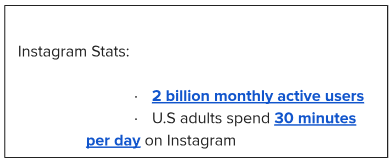
Pros and cons of using Instagram for business:
| Pros | Cons |
| Unique features including: · Professional dashboard for analytics and tracking your performance. It also lets you view insights on your stories, reels, and posts. · Interactive Bio for making your profile creative and interactive. · Live Rooms for hosting live sessions with 3-4 guests.· Quick replies, which are pre-drafted messages to stay in touch with your customers | You cannot turn off direct messages and limit those who can contact you. |
| Contact option to allow your followers to connect with you directly over email, phone, or your address. | All the features are not available to everyone. For instance, the Swipe Up feature is available to only those business accounts with a following of 10,000. |
| Instagram ads to boost your posts and increase sales and visibility. | Your business account cannot be set to private. |
An interesting example of the successful use of Instagram post ideas is how Novo Nordisk, a global healthcare company, used Instagram to increase its engagement rate by 28 percent. It conducted interactive poll ads to understand patient behavior and help them make better lifestyle decisions.
Facebook For Business
Owned by Meta, Facebook is a social networking site that allows you to connect with friends, family, and coworkers globally. A Facebook business page is a free-to-use resource that helps you create your online communities and grow your audience.
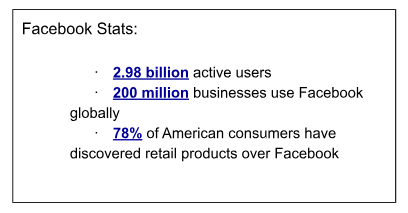
Pros and cons of using Facebook for business:
| Pros | Cons |
| Largest social media platforms globally. You gain exponential reach. | To make the most of Facebook, you need to invest money in ads to boost your reach. |
| Targeted advertising options to link with specific demographics based on age, location, and buying behavior. | It is an open platform where negative comments can get viral. Your business account is also accessible to trolls and spammers. |
| Easy communication to receive feedback about your products and services. | All your posts are visible publically. You can’t control who accesses your posts. |
| Facebook Insights feature to know what content works and how to plan for the future. |
Snapchat For Business
Although Snapchat has been around since 2011, businesses have just started recognizing its importance. It is a messaging app that allows users to create and exchange pictures and videos (called ‘snaps’), which disappear after they are viewed. It is perfect for businesses who want to reach audiences that are below 35 years.
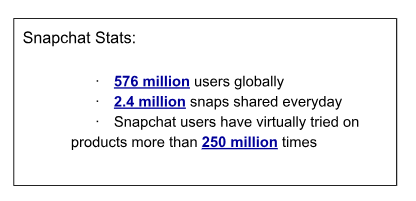
Pros and cons of using Snapchat for business:
| Pros | Cons |
| One-on-one engagement with target consumers. | Snapchat doesn’t have a re-share option, which limits your content’s virality. |
| Easy to reach a younger audience. | Limited analytics that only allows you to see the number of views and screenshots. |
| Establish a fun brand personality. | Its disappearing feature makes your content short-lived. |
| Availability of creative tools such as filters, stickers, and lenses to create more engaging content. |
Pinterest For Business
One of the most unique social media platforms, Pinterest is designed to allow users to save and discover ideas and inspiration. Its main focus is to encourage people to buy, making it ideal for businesses to market their products and get more leads.
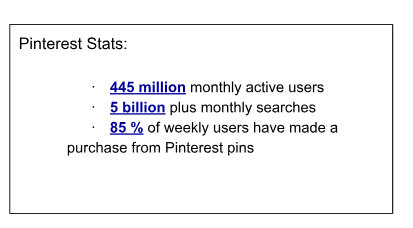
Pros and cons of using Pinterest for business:
| Pros | Cons |
| Embedding pictures from external sites is easy making it easy for businesses to divert traffic to your website. | The images that you use should be very specific and meet stringent technical requirements. |
| Pinterest boards are all public. It is easy for brands to connect with more users. | Pinterest has strict IPR conditions. |
| Conversion rates are higher. | Being a public platform, it is difficult to control where your content goes. |
While Pinterest is mainly used by real estate, fashion, and jewelry companies, an excellent example is that of General Electric. A manufacturing and engineering company, GE successfully garnered a lot of attention through its ‘All in Good Food” pins. The company shared fabulous recipes that feature its appliances and equipment.
TikTok
TikTok is a video-sharing application where users can create and share short-form music-focused videos. TikTok for business is a centralized platform for businesses where they can create ads that reach its target audiences while analyzing the data and insights. It is mainly used by businesses in industries such as travel, sports equipment, and higher education.
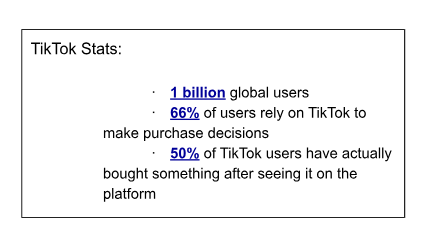
Pros and cons of using TikTok for business:
| Pros | Cons |
| Content can go viral easily and your business can gain exponential exposure. | The user base is primarily younger people. |
| Businesses can create authentic and interesting profiles. | Since the videos are short, there is a risk of a limited attention span. |
| You can make use of the power of influencer marketing. | TikTok’s analytics abilities are limited to basic views, likes, and shares. |
| It offers interactive ad options such as in-feed videos, branded hashtag challenges, etc, | Trends may saturate over time. |
Best Social Media Platforms for Business-To-Business Industries
B2B social media strategy adopts a different approach. The platforms that a B2B company uses must help them reach decision-makers and owners of businesses.
If you are in the B2B industry like transportation, SaaS, construction, real estate, etc., here are the best social media platforms that you can benefit from:
Twitter for Business
Currently rebranded as ‘X’, Twitter is a microblogging site where people post tweets, images, and videos. Twitter thrives on conversations, which makes it the perfect platform for businesses to raise awareness about it’s products, divert leads to its website, and engage with customers.
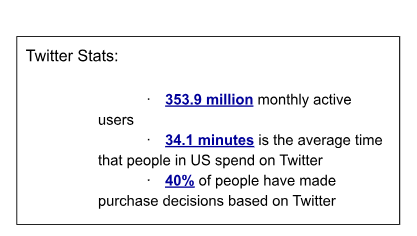
Pros and cons of using Twitter for business:
| Pros | Cons |
| Crafting a tweet is easy. It’s the fastest way to communicate about your products. | It may take years for a business to build awareness. |
| Twitter has a marketing system to help divert traffic to your website without spending money. | Tweets have limited characters. You may have to skim the information. |
| Strong analytics for noticing trends and insights. | A Twitter business account can only have up to 2000 followers. |
| An excellent medium for quick customer feedback and market research. | With billions of tweets every day, your business’s tweets may get buried. |
LinkedIn for Business
By far, the most preferred social media platform for B2B businesses, LinkedIn’s user base is mostly professionals. Businesses have an opportunity for B2B lead generation using LinkedIn and is the perfect channel for building your company’s profile, raising your networks, and gaining the attention of potential business partners.
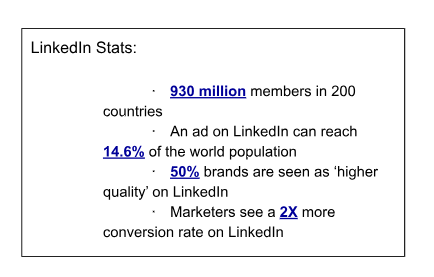
Pros and cons of using LinkedIn for business:
| Pros | Cons |
| Your business can target its ideal audience through groups, communities, and LinkedIn ads. | You may have limited reach as compared to other platforms like Instagram and Facebook. |
| LinkedIn ads are cost-effective as compared to other social media platforms. | LinkedIn’s advertising formats are limited and may curtail creativity. |
| LinkedIn analytics are strong and help you measure engagement rates, performance of ads, and post reach. | Sending unsolicited connection requests may be seen as spamming and damage your business’s goodwill. |
YouTube
Besides these major social media platforms, there is another platform that has proved to be extremely effective for businesses, both B2C and B2B. YouTube is a video-sharing platform, which allows viewers to consume and share your content.
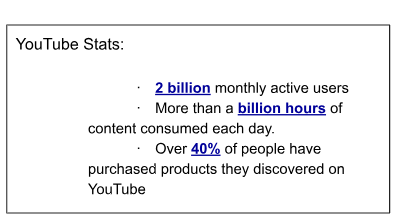
Pros and cons of using YouTube for business:
| Pros | Cons |
| Your business can reach out to a huge audience globally. | YouTube channels can get hacked resulting in loss of money and goodwill. |
| Less censorship, which allows you to be creative and innovative with the content. | Good-quality videos require time and resources. |
| Easy to divert traffic by adding links to product pages and websites. | Ranking the videos can be difficult. |
Summing Up

While these are the best social media platforms for businesses, there is no magic bullet to decide which platform will serve you the most. If you are just getting started with building your business’s social media presence, these tips and indications can be a great place to start. To gain the maximum mileage and returns on your investment, use our professional expertise. Get in touch with Lean Summits to know more.



